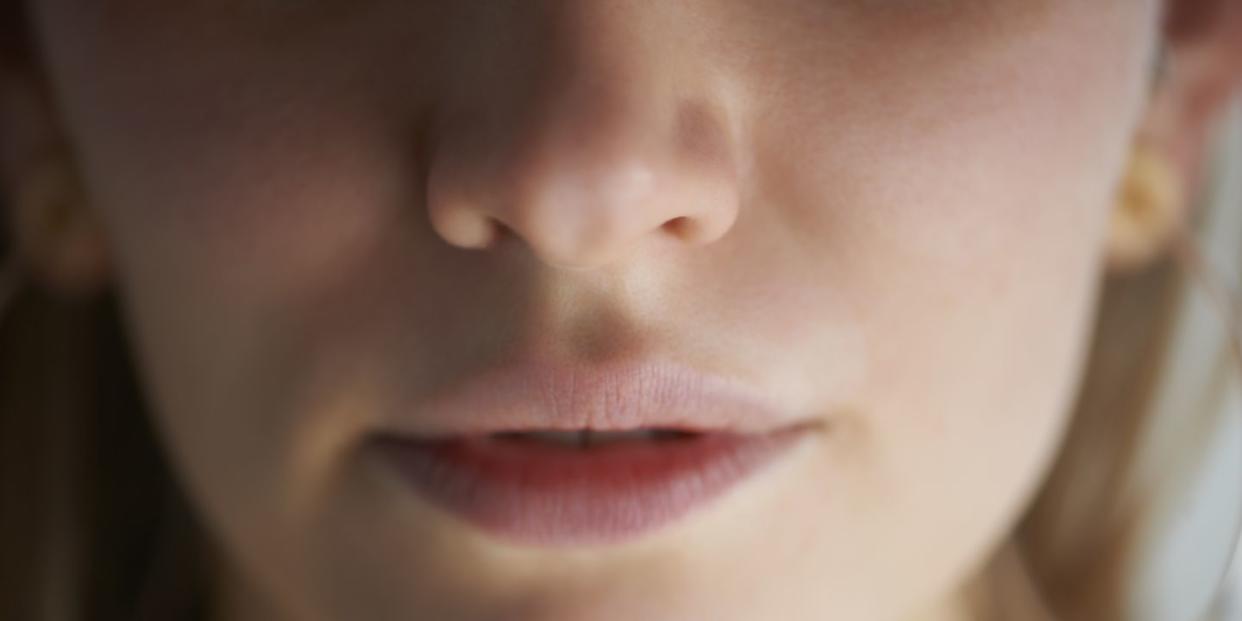Here’s the Deal With the Study That Allegedly Linked Nose-Picking to Dementia

"Hearst Magazines and Yahoo may earn commission or revenue on some items through the links below."
Dementia is a terrifying illness that impacts more than 20% of American adults between the ages of 85 to 89. There’s a lot doctors don’t understand about dementia and why people develop it, but one study has a theory: Dementia could be linked to nose-picking. Sort of.
The study, which was published in Scientific Reports in February, has suddenly gotten a lot of attention after a press release from Griffith University says that the study—which was led by Griffith researchers—suggests that picking your nose could increase your risk of developing Alzheimer’s and dementia.
But the study itself is a little more complicated than that. If you’ve ever picked your nose—and many people have—it’s understandable to have questions.
What did the study on Alzheimer’s and nose picking find, exactly?
It’s important to point out that the study was done on mice—not humans. For the study, the researchers took Chlamydia pneumoniae, a respiratory tract pathogen that can infect the central nervous system, and rubbed it on the inside of the noses of some mice. (A Chlamydia pneumoniae infection of the central nervous system has been linked to the development of dementia later in life.)
The researchers found that infecting mice this way led to “dysregulation” of “key pathways” involved in the development of Alzheimer’s disease.
The researchers concluded that the nerves that go from the nasal cavity to the brain “constitute invasion paths” by which Chlamydia pneumoniae can “rapidly invade” the central nervous system, leading to the deposit of amyloid beta deposits, i.e. amino acids found in the brains of people with Alzheimer’s disease.
It’s important to point out that the study didn’t specifically tie nose-picking to dementia, but one of the researchers suggested the connection in the press release. Study co-author James St. John, Ph.D., head of the Clem Jones Centre for Neurobiology and Stem Cell Research at Griffith University, said in the press release that people should avoid picking their nose because of the risk of being exposed to bacteria. “Picking your nose and plucking the hairs from your nose are not a good idea,” he said. “We don’t want to damage the inside of our nose and picking and plucking can do that.”
St. John added, “If you damage the lining of the nose, you can increase how many bacteria can go up into your brain.”
However, St. John said that there’s a lot more work to be done before this connection can really be established. “It’s research that has been proposed by many people, but not yet completed,” he said. “What we do know is that these same bacteria are present in humans, but we haven’t worked out how they get there.”
Dementia causes
Dementia is an umbrella term for the impaired ability to remember, think, or make decisions that interfere with everyday activities, according to the Centers for Disease Control and Prevention (CDC). Alzheimer’s disease is the most common type of dementia, but there are other forms, including vascular dementia and Lewy body dementia.
The exact causes of dementia aren’t well understood, but the CDC lists off several factors that increase your risk of developing the condition. Those include:
Getting older (most cases impact people 65 and up)
Having a family history of dementia
Being African-American or Hispanic
Having poor heart health—specifically, high blood pressure and high cholesterol
Having had a traumatic brain injury
“The brain ages at different rates for different people,” says Amit Sachdev, M.D., director of the division of neuromuscular medicine at Michigan State University. “The major predictors are genetics, toxic exposures like alcohol, and general health.”
So, can picking your nose cause dementia?
Eh. That’s a hard sell at this point, Dr. Sachdev says. “I do believe this bacteria can infect the nose. This is a very clear finding,” he says. “That infection can damage the nerves present in the nose. However, this damage of local nerves to the nose leading to brain injury is a leap too far.”
Dr. Sachdev says there’s really no good evidence of a link between nose picking and dementia. Thomas Russo, M.D., professor and chief of infectious disease at the University at Buffalo in New York, agrees. “Chlamydia pneumoniae as a causative agent for dementia is quite uncertain,” he says.
And, while picking your nose isn’t exactly socially acceptable, it’s also a potential risk factor for getting a host of infectious diseases, says Thomas Russo, M.D., professor and chief of infectious disease at the University at Buffalo in New York. “It is not a particularly hygienic habit,” he says. “If you have contaminated your hands and fingers with a respiratory virus, this is a way to directly inoculate yourself. People should try the best they can to avoid doing this to minimize the risk of respiratory tract infections.”
Overall, while it’s not great to pick your nose, it’s hard to say that it will actually give you dementia. “If you are concerned about dementia, then, at this time, maintaining an overall healthy body is more important than avoiding nose picking,” Dr. Sachdev says.
You Might Also Like

